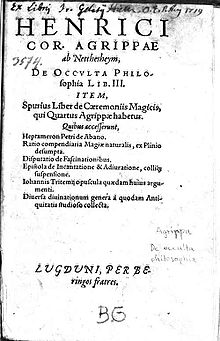- Three Books of Occult Philosophy
-
 Man inscribed in a pentagram, from Heinrich Cornelius Agrippa's Three Books of Occult Philosophy. The signs on the perimeter are astrological.
Man inscribed in a pentagram, from Heinrich Cornelius Agrippa's Three Books of Occult Philosophy. The signs on the perimeter are astrological.
Three Books of Occult Philosophy (De Occulta Philosophia libri III) is Heinrich Cornelius Agrippa's study of occult philosophy, acknowledged as a significant contribution to the Renaissance philosophical discussion concerning the powers of ritual magic and its relationship with religion.
The three books deal with Elemental, Celestial and Intellectual magic. The books outline the four elements, astrology, kabbalah, numbers, angels, God's names, the virtues and relationships with each other as well as methods of utilizing these relationships and laws in medicine, scrying, alchemy, ceremonies, origins of what are from the Hebrew, Greek, and Chaldean context.
These arguments were common amongst other hermetic philosophers at the time and before. In fact, Agrippa's interpretation of magic is similar to the authors Marsilio Ficino, Pico della Mirandola and Johann Reuchlin's synthesis of magic and religion and emphasize an exploration of nature. Unlike many grimoires of the time, before and past, these books are more scholarly and intellectual than mysterious and foreboding. These books are often read as authoritative by those interested in the occult even today.
Contents
Relation to the Knights Templar and magic use
Three Books of Occult Philosophy helped perpetuate the belief in modern popular culture that the Knights Templar practiced witchcraft. It was one of the first literary works to transform the accusation of idolatry against the Order, to magic use.[citation needed]
See also
- Occultism
- Hermeticism
- Kabbalah
- Vitruvian man
References
- Three books of occult philosophy, written by Henry Cornelius Agrippa, Annotated by Donald Tyson (2005). llewelyn worldwide. (ISBN 0-87542-832-0)
External links
Categories:- 1531 books
- Grimoires
- Astrological texts
- Christian Kabbalah
- Hermetic Qabalah
- Kabbalah texts
Wikimedia Foundation. 2010.

